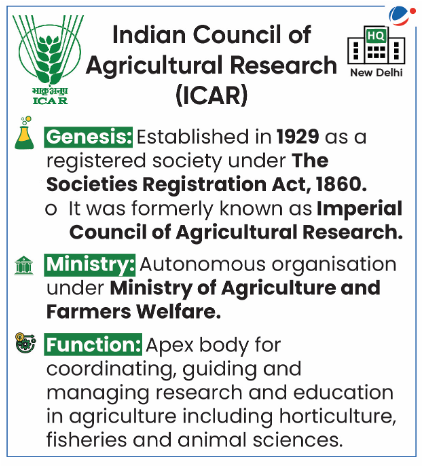Why in the News?
The Indian Council of Agricultural Research (ICAR) celebrated the Golden jubilee year of establishment of the Krishi Vigyan Kendra (KVK).

About Krishi Vigyan Kendra (KVK)
- KVKs aims at assessment of location specific technology modules in agriculture and allied enterprises.
- KVKs are the only institution at the district level in India for technological backstopping in agriculture and allied sectors.
- They are an integral part of the National Agricultural Research System (NARS).
- NARS in India comprises of Indian Council of Agricultural Research (ICAR) at national level and the State Agricultural Universities (SAUs) at the state level, are major partners in growth & development of Agricultural Research and Education.
- KVKs have been functioning as Knowledge and Resource Centre of agricultural technology and linking the NARS with extension system and farmers.
- Agricultural extension (also known as agricultural advisory services) plays a crucial role in boosting agricultural productivity, increasing food security, improving rural livelihoods, and promoting agriculture as an engine of pro-poor economic growth.
- Currently there are around 731 KVKs in the country, established under eleven Agricultural Technology Application Research Institute (ATARI) zones.
- Financing:
- KVKs are 100% financed by the Centre.
- KVKs are working under State Agricultural Universities, ICAR institutes, Government and Non-Government Organizations working in Agriculture.
- Other information:
- Dr. Mohan Singh Mehta committee appointed by ICAR in 1973, mooted the idea of establishment of Farm Science Centre (Krishi Vigyan Kendra) in the Country.
- The first KVK was established in 1974 at Puducherry under the Tamil Nadu Agricultural University (TNAU), Coimbatore.
Role of KVKs in Agricultural Extension Services (AES)
- On-Farm Testing: KVKs conduct field trials to assess the adaptability of new agricultural technologies under different farming systems.
- Frontline Demonstrations: They demonstrate the latest agricultural technologies to the farmers and the extension workers to expedite the technology generation and its adoption.
- Surveys suggest that 97.33% of KVK demo-farmers have good knowledge of paddy cultivation as compared the non-demo farmers.
- Advisory Services: They provide necessary information and advisory services to the farmers on various aspects of agriculture like cropping patterns, pest control, post-harvest technology etc.
- Training: They organize training programs to update the farmers within the district with latest advances in agricultural research on regular basis.
- Seed and Planting Material Production: KVKs undertake production of good quality seeds and planting materials for distribution to the farmers.
- Resource and Knowledge Centre: KVKs serve as agricultural technology resource and knowledge centres, supporting public, private, and voluntary sector initiatives in agricultural economy.
Challenges in Agricultural Extension Services
|
Conclusion
There is need to strengthen the resource base through increased budgetary allocations and dedicated human resource to address the resource constraints faced by the KVKs. Moreover, upgrading Infrastructure through inclusion of equipped laboratories, demonstration farms, and training facilities, can improve the KVKs' ability to deliver quality services.



